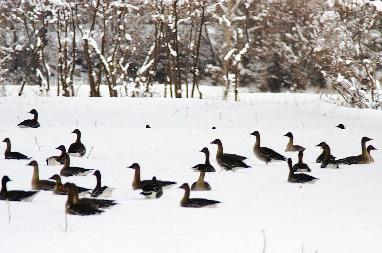China's wild animal guardians said that much needs to be done to save wild animals trapped in the snowbound Pamir Plateau in northwest China from starvation.
"We estimate that some 100,000 wild animals have been trapped in the mountains to the southwest of Xinjiang," said Dai Zhigang, head of the endangered animal protection station under the Forestry Bureau of Kashi Prefecture, Xinjiang Uygur Autonomous Region, in western China.

Dai said that new sightings of dead animals, mainly grazing species and wild birds, have been reported by wardens every day since Feb. 7, when the blizzard waned. The station could not provide an exact death toll because it lacked personnel to do a full survey.
"We have raised small sums for hay at 20 locations, but we lack the money and manpower to do more," said Dai.
The plateau's eastern slope is the prime breeding area for 300 wild bird species and more than 100 mammal species including argali (Marco Polo) wild sheep and black stork, China's most endangered species.
The worst winter weather in 50 years has blocked animals' feeding paths. The latest remote-sensing figures from the Xinjiang Observatory suggested that snow covers 750,000 square kilometers in southern Xinjiang, of which 440,000 square km had snow cover of more than 10 centimeters deep.
Dai said that there used to be some 4,000 argali wild sheep roaming the area. The rare species, unique to the Pamirs, may face extinction due to lack of food in early spring, when mountain vegetation is hard to find, especially after the snowstorm. Many feeble members of the species have fallen prey to wild carnivores.
The situation of the snow leopard, wild yak and Tibetan mustang is more optimistic, since they can better tolerate arctic temperature, said Dai.
In villages in Shule County, Kashi Prefecture, thousands of wild geese were found starved in a cornfield covered with snow. Villagers said that they often saw wild birds fall from the sky due to hunger. Herdsmen and farmers also complained that starving wild animals often intruded into fields and barns in search of food.
The weather also struck Xinjiang's agricultural and animal-husbandry sectors hard, causing losses estimated at 4.7 billion yuan (653 million U.S. dollars), said the regional government earlier this month. The figures showed that 54 percent of fruit tree plantations had been affected by the disaster and more than 100,000 livestock had died.
(Xinhua News Agency March 1, 2008)